St. John's Municipal Chairmen and Mayors, 1888-1988
by
Melvin Baker (c)1988
"Originally Published in the Newfoundland Quarterly,
Vol. LXXX1V, No. 1, Summer 1988, pp. 5-11.
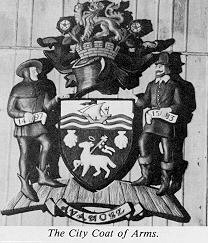
by
Melvin Baker (c)1988
"Originally Published in the Newfoundland Quarterly,
Vol. LXXX1V, No. 1, Summer 1988, pp. 5-11.

At the Council Board (excerpt from "a light operetta" by Charles E. Hunt, Christmas Bells, 1915)
Who can deny that we really try
To do the best we can
In every way by night and day
To help our fellow man;
Our funds are not exactly what
The citizens require
To have in hand, but understand
That all of us aspire
To better times when countless dimes
Will in our coffers flop,
When these days come, we'll make
things hum.
And run a better shop.
(from the Council Letter Books, 12 June 1912)
Mr. James Murphy
City
Dear Sir,
Your letter's contents duly noted
Request therein discussed and voted
And granted you have been permission
To proceed with all expedition
To start your architectural stunt
And burnish up your house's front,
For after nineteen toilsome years
The house, indeed, must need repairs
I answer without fear or flattery,
Secretary-Treasurer
John L. Slattery
On 9 May 1888 the Newfoundland Government passed legislation for the management of the local affairs of St. John's. Under the 1888 Municipal Act, a Municipal Council consisting of two government appointees and five councillors elected on a ward system basis governed the city. In 1898 the act was amended so that only three councillors, all appointed, managed the city. Four years later change again was the order of the day with St. John's residents now electing at large a mayor and six councillors. This elected system lasted until 1914 when the government appointed another commission. This commission's mandate was to draft new municipal legislation (the Charter, as it came to be known) based on its experience in administering the city. In 1916 St. John's reverted to its pre-1914 form of elected government with a new Council remaining in office until 1920. In that year another commission ran city affairs pending the legislative enactment in 1921 of the Charter. The 1921 City Act, which forms the basis of the present municipal government in St. John's, provided for the election at large of a mayor and six councillors. In 1969 the number of councillors was increased from six to eight, while in 1981 the city adopted a partial ward system. Under this new arrangement, citizens elect four councillors at large and four through a ward system.
James Goodfellow (1888-1890)
Born in 1830 in Tranent, Scotland, Goodfellow came
to Newfoundland in 1850 to work as a clerk for McBride
& Kerr, establishing his own fish supply business in 1869.
In 1888 he accepted an appointment from Premier Robert
Thorburn to be the first chairman of the Municipal Council.
In May 1890 Liberal Premier William Whiteway, who
had won the general election in November 1889, replaced
Goodfellow with a Liberal nominee. On 23 January
1892 he re-entered municipal politics as a councillor for
ward three, but did not seek re-election in 1896.
Goodfellow suffered extensive financial losses in
December, 1894, with the failure of the Commercial
Bank, of which he had been a long-time director. The
subsequent legal investigation of Newfoundland's banking
system placed a heavy strain on his health, resulting
in his death on 25 January 1898 at St. John's.
Michael Power (1890-1892, 1894-1898)
Born in St. John's in 1842, Power operated a large
coopering business. He won election on 30 August 1888
as councillor for ward five and was re-elected in 1892 and
1896. A supporter of Premier Whiteway, in 1890 "Councillor
Power", as he was popularly known, was the choice
of the Liberal majority on Council to be Goodfellow's
successor as Chairman, remaining in this position until
1892. Following various changes in the colonial government
in 1894, he became Chairman again in that year and
remained so until the establishment in 1898 of an appointed
commission. In the 1902 election, he unsuccessfully
attempted to win election as a councillor as part
of a "Big Six" ticket of six candidates. Power was appointed
in 1914 to the Legislative Council. He died at St.
John's on 9 December 1927.
Thomas Mitchell (1892-1893, 1894)
Born in St. John's in 1842, Mitchell operated a bakery
from the early 1870s until his death at St. John's on 25
August 1904. He advocated the development of local industries
and was active in the Home Industries Society
of the late 1880s. Appointed to the Council in 1892 by
Premier Whiteway, Mitchell proved not to be a loyal
Liberal and cast his lot with the Tory councillors who
managed in February 1892 to have him elected Council
Chairman, denying the Liberals an expected majority
on Council. He was chairman when fire destroyed St.
John's on 8 July 1892. Following the reselection of the
Whiteway government in November 1893, Mitchell lost
his place on Council to a more loyal government supporter,
Thomas Edens. When the Tories assumed of flee
in April 1894, Mitchell returned to Council. His tenure
was again short lived, for in December the Liberals
resumed office and again removed Mitchell.
Herbert C. Burchell (1898-1902)
Born in Sydney, Nova Scotia, on 7 August 1855, Burchell
was Newfoundland Government Engineer from
1884 to 1905 and served as Municipal Commission Chairman
from 1898 to 1902. As Chairman, he oversaw the
paving of Water Street and the building of a street railway
system by the St. John's Street Railway Company, owned
by the Canadian railway builder Robert Gillespie Reid.
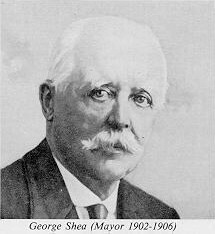
George Shea (1902-1906)
Born in St. John's on 4 July 1851, Shea in 1886
became managing partner of Shea & Co, a shipping and
commission firm owned by his uncle, Ambrose Shea. He
was the Member of the House of Assembly (MHA) for
Ferryland (1885-1889 and 1897-1900) and St. John's East
(1904-1913). From 1904 to 1908 he was a minister without
portfolio in the government of Liberal Premier Robert
Bond. On 19 June 1902 Shea won election as the first
mayor of St. John's. During his mayoralty Council
brought stability to the city's finances, which for a decade
had operated at a deficit, and implemented major improvements
to the water system. Shea failed in his bid
to win re-election in 1906. In 1920 Liberal Premier
Richard Squires appointed him to the Legislative Council,
and during the 1920s he occasionally served as Acting
Premier when Squires was absent from the Island.
He died at St. John's on 13 September 1932.
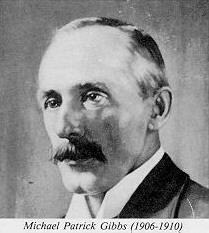
Michael Patrick Gibbs (1906-1910)
Born in St. John's on 25 March 1870, Gibbs was called
to the Newfoundland Bar in 1895. Active in Tory
political circles, he was the MHA for St. George's from
1897 to 1900. In the early 1900s he provided legal advice
during the formation of city labour unions. He was
especially helpful in the formation of the Longshoremen's
Protective Union in 1903 and served as the Union's
solicitor until his death. With labour support, he won the
mayoralty in the 26 June 1906 election. His administration
saw St. John's improve working and living conditions for
labourers and the poor. Because of his pressing
professional and other political commitments, Gibbs did
not seek reselection in 1910. In 1909 Premier Morris appointed
him to the Legislative Council and he remained
a member of the Council until the suspension of Responsible
Government in 1934. On 7 November 1943 Gibbs died at St. John's.
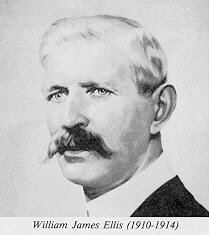
William James Ellis (1910-1914)
Ellis, born in St. John's on 9 July 1857, and his
brother, John, had established their own construction
business by 1890. In the early 1890s they built the main
tunnel for a new city sewerage system and after the fire
of 8 July 1892 put up many of the city's new buildings.
In 1902 and 1906 he won election to the Municipal Council,
in the later election polling the highest vote for coun-
cillor and becoming Deputy Mayor. In the 27 June 1910
election, Ellis won the mayoralty by acclamation. During
his term as mayor from 1910 to 1914, Council continued
former mayor Gibbs' program of sanitary and
housing improvements for the poor, while in 1911 it opened
the first municipally owned city hall. From 1904 to
1909 he was the MHA for Ferryland and was a member
of the Legislative Council from 1917 to 1926. He died
on 19 April 1926 in New York City while returning to
Newfoundland from California, where he had gone for
the winter for health reasons.
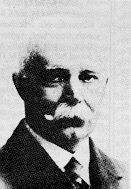
William Gilbert Gosling (1914-1921)
Born on 8 September 1863 at Paget, Bermuda, Gilbert
Gosling came to St. John's in 1881 to work as a clerk
for the fish exporting firm of Harvey & Co. Concerned
over social and urban problems, the Board of Trade
under his direction organized a citizens' committee to
investigate municipal matters in the city. The result was
legislation in 1914 which replaced the elected municipal
council with an appointed commission which drafted a
new municipal charter under Gosling's chairmanship. The
legislature refused to pass this charter in 1916, instead
restoring the elective form of local government. Gosling
won the mayoralty in the 29 June 1916 civic election.
Under Gosling's dynamic leadership between 1916 and
1920, Council revised the taxation system, started a public
housing program, and championed public health causes.
When the government in 1920 failed to pass the charter,
Gosling agreed to serve as chairman of a temporary appointed
commission until the enactment the following
year of a charter. In 1921 he withdrew from civic life for
business and health reasons and subsequently retired in
1927 to his native Bermuda, where he died on 5 November
1930. His wife later donated his extensive collection of
books to the people of St. John's to form the basis of
the city's public library, which opened in 1936.
Isaac C. Morris (1921)
Born in St. John's on 11 June 1857, Morris operated
a sailmaking business. An appointed member of the
Municipal Commission from 1914 to 1916, he won election
to Council in 1916. In 1920 he accepted an appointment
to another Municipal Commission. Following Gosling's
resignation, Morris served as Chairman for nearly
six months in 1921 until the election of a new Council.
He ran unsuccessfully for the mayoralty on 15 December
1921. Morris was a prolific writer for the local press on
the social and political issues of the day and was also a
popular public speaker. He died at St. John's on 5 June
1937.

Tasker Cook (1921-1929)
Born in St. John's on 30 June 1867, Cook managed
a ship's chandler business and later a tinsmith firm. He
won election as mayor on 15 December 1921 and by acclamation
in 1925. His term in office saw Council undertake various
public works improvements and in 1928
make a start on civic planning with the appointment of
a Town Planning Commission. Generally, Council's ability
to effect any significant improvements, as Cook noted
in a 1925 "Bricks without Straw" address to the Rotary
Club, depended on increased taxation, an unpopular
measure at the best of times and one on which Cook and
his predecessors proved unwilling to act. He lost to
Charles J. Howlett in the 9 December 1929 election.
Premier Squires appointed Cook to the Legislative Council
in 1928 and to his cabinet as a minister without portfolio
as well as chairman of the Newfoundland Railway
Commission. For many years he was the Newfoundland
Consul for the governments of Portugal, Denmark, and
Norway. He received a Knighthood in 1931. On 25
September 1937 he died at St. John's.
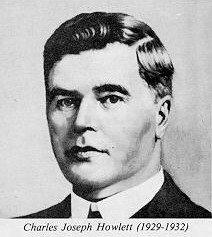
Charles Joseph Howlett (1929-1932)
Born in St. John's on 25 January 1885, Howlett
graduated in dentistry from the University of Toronto
in 1901 and the Philadelphia Dental College in 1905.
From 1916 to 1929 he was President of the Newfoundland
Dental Board. His concern for improved civic services
prompted him to run for mayor in the 9 December 1929
election, defeating incumbent Tasker Cook. Under
Howlett's mayoralty, the city's financial and
administrative systems were reorganized and Duckworth
and New Gower Streets were paved. In January 1932 he
helped establish the Civic Relief Committee to provide
coal and other assistance to help the city's poor through
the economic depression of that time. It was also in 1932
that Council, through Howlett's efforts the previous year,
convinced the Squires Government to float its first bond
issue of $500,000. Howlett died at St. John's on 31 March
1932.
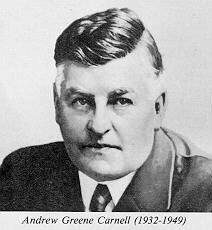
Andrew Greene Carnell (1932-1949)
Born in St. John's on 10 April 1877, the son of former
councillor John T. Carnell, he assumed the management
of his family's carriage and undertaking business in 1903.
After two unsuccessful forays into colonial politics in
1908 and 1919, Andy Carnell found the municipal arena
more to his liking. In 1929 he polled the highest vote for
councillor and became Deputy Mayor. Following the
death of Mayor Howlett in 1932, he served as Acting
Mayor until the 1933 election, when he won the mayoralty
by acclamation. He repeated this feat in 1937, and in 1941
and 1945 he easily defeated his opponents. Carnell proved
to be a popular mayor and, during the period from
1934 to 1949 when Newfoundland was governed by a
British-appointed Commission of Government, citizens
often referred to him as the "Mayor of Newfoundland."
Carnell and his Councils stood up to the Commission in
championing the city's rights; in 1937 and 1944, for instance,
the city negotiated reductions in the civic debt the
municipality owed the government. During the early
1940s, Council, with Deputy Mayor Eric Cook in the
lead, played a strong role in convincing the Commission
to undertake public housing reforms, resulting in the 1944
organization of the St. John's Housing Corporation. This
Corporation was responsible for the Churchill Park housing
development and other suburban housing in the late
1940s and the 1950s. In 1948 Carnell helped establish a
citizens' committee to raise funds for the construction of
Memorial Stadium which was opened in 1955. Also referred
to as "The LaGuardia of St. John's," Carnell's
Councils maintained a vigorous program of sewer, water,
and street improvements, while simultaneously providing
taxpayers with "Solvent, Sane and Square Civic Government."
On 8 November 1949 Carnell failed to win his
fifth term as mayor. He died at St. John's on 26 January
1951.
H. G. R. Mews (1949-1965)
Born in St. John's on 18 December 1897, Harry
Mews, an insurance company manager, won a seat on
Council in a 1943 by-election. Re-elected in 1945, he
defeated Carnell for the mayoralty in 1949 and won re-election
four times until his retirement in 1965. Mews provided
strong leadership in guiding the city through its
rapid demographic, physical and economic growth in
post-Confederation St. John's. During his tenure, Council
successfully dealt with the severe financial problems
brought on by lost revenue sources, the result of federal-
provincial taxing agreements Newfoundland had entered
with its new federal government after 1949. His Councils
initiated a slum-clearance program in the city's congested
centre, pursued the development of public housing
projects in various parts of St. John's, planned a large
surburban housing development in the city's northeast
area and undertook extensive sewer and water extensions.
In 1957 Council assumed control of the privately owned
bus service and subsequently operated it as a public concern
under the management of the St. John's Transportation
Commission. In the early 1950s, Mews established a
secret fund, which by 1966 had grown to $2 million
out of various service fees and city land sales; this fund
was subsequently used to build on New Gower Street a
new city hall which opened in 1970. In 1949 Mews unsuccessfully
led the Progressive Conservatives against
Liberal Premier Joseph R. Smallwood in Newfoundland's
first provincial election. He died at St. John's on 6
January 1982.

William Gilbert Adams (1965-1973)
Born in St. John's on 17 June 1923, Bill Adams was
a 1952 graduate of Dalhousie Law School. He won election
to the Municipal Council on 14 November 1961 and
became Deputy Mayor. With the retirement of Harry
Mews in 1965, he defeated Alec Henley, a city councillor
since 1957, for the mayoralty on 16 November 1965, be
ingre-elected as mayor in 1969. During his eight years
in of rice, Council continued substantial water and sewer
improvements required for the city's rapid suburban
growth and entered into a Neighbourhood Improvement
Program agreement for the urban renewal of the Mundy
Pond area. Adams was the Liberal MHA for St. John's
West from 1962 to 1966 and for Twillingate from 1971
to 1972. In 1979 he was appointed Chief Judge of the
Newfoundland District Court.
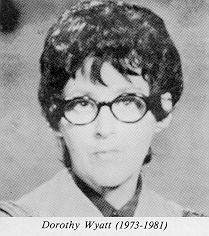
Dorothy Wyatt (1973-1981)
Born in St. John's, Wyatt was a nursing graduate of
the General Hospital in St. John's in 1952 and worked
for many years as a nurse in both the public and private
sectors. In 1969 she received a Bachelor of Nursing degree
from Memorial University. Later that year she won election
to Council as the city's first female councillor and
in the 13 November 1973 election she defeated incumbent
Mayor Bill Adams to become the city's first female
mayor. A colourful and popular mayor, she won re-election
in 1977. During her mayoralty, St. John's hosted
the Canada Summer Games in 1977, changed its century-old
taxation system from a rental-value to a capital-value
system in 1980, and adopted a partial ward system in
1981. The 1970s also saw the city approve the construction
of modern high-rise office buildings in the Water
Street commercial district. Defeated in her try for a third
term as mayor in the 3 November 1981 election, Wyatt
returned to civic politics in the 12 November 1985 election
as a councillor at large.
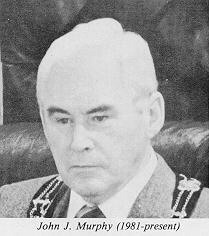
John Joseph Murphy (1981-present)
Born in St. John's on 24 September 1922, John Murphy
worked for several years as a radio news announcer
and an advertising executive. In 1953 he became
associated with the wholesale firm of Halley and Company
and developed a local chain of the popular Arcade
stores in the city. After unsuccessful forays into provincial
politics as a Liberal candidate in 1966 and 1970, he
won election on 13 November 1973 to City Council as
councillor and became Deputy Mayor. Defeated in his
first try for the mayoralty on 8 November 1977, on 3
November 1981 he defeated incumbent Mayor Wyatt. In
1985 he won re-election by acclamation. During his tenure
to date, Council has devised a detailed zoning and planning
procedure, which rationalized what was, up to then,
ad hoc planning arrangements for commercial and
residential development. Council has also made strong
efforts to preserve the historical character of older sections
of the city and has begun work on an imaginative
infill housing scheme in the older areas of the city, in the
process winning nationally recognized awards for its
efforts.
Secretary-Treasurers/City Clerks
1888-1898 P. W. Kelly
1898-1899 John L. Slatterly
1899 M. K. Greene
1899-1920 John L. Slatterly
1920-1952 J. J. Mahoney
1952-1970 Edward B. Foran
1970-present Rupert J. Greene
City Engineers
1888-1890 Charles J. Harvey
1890-91 F. H. Balfour (Acting Engineer)
1891-92 R. M. Pratt
1892-1893 A. J. Waghorne (Acting Engineer)
1893-1894 S. M. Chapman
1894-1896 R. M. Pratt
1896-1920 John Ryan
1920-1944 William P. Ryan
1944-1949 Grant Jack
1949-1959 Ronald Martin
1959-1963 Duncan Sharpe
1963-1979 Eric Mercer
1979-present James Finn